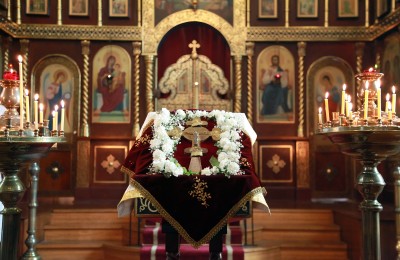 Orthodox Christianity of the XXth century, with the help of some well-known theologians, especially those of the so-called ‘ Paris School ’, rediscovered patristic theology and the patristic approach to the Church.
Orthodox Christianity of the XXth century, with the help of some well-known theologians, especially those of the so-called ‘ Paris School ’, rediscovered patristic theology and the patristic approach to the Church.
Nowadays this discovery is going on and is becoming more profound. I believe it important to emphasise the difference between knowledge of patristic writings and patristic theology. There are some scholars who study and publish Holy Fathers, but do not go to church and, sometimes, are not believers. Patristic theology is an approach to church life based on that of Holy Fathers. This means bearing witness of the fullness of Divine revelation for your times. For Holy Fathers, such witness was closely connected with true Eucharistic life. Thus, for example, St John Chrysostom insisted that it is necessary to go to Communion every time when attending Divine Liturgy. And in many of our parishes, though of course, not in all of them, God’s people receive Communion every Sunday and on every feast day.
Such practice has its positive aspects, as it is a return to the patristic understanding of church life. But this frequent communion has its dangers, namely, two possible extremes. Some people, following a Russian so-called tradition or, rather, custom, believe it necessary to go to Confession every time before receiving Communion. Others totally forget that confession exists at all. In both cases, repentance and confession lose all their meaning. And when these ‘foreigners’ come to Russia , they are often not allowed to have Communion. I remember how I — at that time a subdeacon — once went to common Confession in the lower church of St Daniel ’s monastery. When, after all the canons and prayers, I approached the priest, he — a severe hieromonk — asked me: ‘Did you fast yesterday?’ I answered: ‘Yesterday I was in an airplane’. The severe hieromonk asked: ‘Where are you from?’ I said: ‘From Paris ’. His answer was: ‘It’s not Paris here. It’s Moscow . I cannot allow you to take Communion!
The practice of three-day long fasting and obligatory Confession before each Communion arose from the tradition of very rare Communion, which developed in the Orthodox world (in Russia , Greece and other parts of the world). Thus, my grandfather, the philosopher Nikolay Onufriyevich Lossky, went to Communion once a year — and not on Easter, like many other people, but on Holy Thursday. Naturally, he prepared himself for it during Lent and went to Confession before Eucharist. Once again, those who take Communion rarely and, of course, every time go to Confession, lose all sense of Confession which becomes a sort of ‘passport’ for approaching the Holy Sacrament of Eucharist.
There are two points about this situation. First of all, it is forgotten that Confession as such, is a sacrament, albeit, of course, connected with Eucharist. However, correct understanding of Orthodox patristic theology connects all the sacraments with the Eucharist or, rather, with the one Sacrament of Baptism-Chrismation-Eucharist. Of course, the objection will be made that we ‘acknowledge one Baptism for the remission of sins’ . Yes, we do. But at every Divine Liturgy we renew the vows of our Baptism when we sing (or say, as Greeks do) the Creed.
Second, there appears to be an approach to the concept of repentance which I find totally distorted. In case of rare Communion, a person repents only for some time in connexion with the Confession and Communion, and, as concerns the rest of the time, he thinks very little about repentance. Therefore, I believe we should ask ourselves what is the correct understanding of repentance. This is especially important for those among us who renew their Communion at every Sunday and festive liturgy. This question is important not only for the serving clergy, but for all the members of God’s people who take Communion every time when they attend Divine Liturgy; in other words, conscious members of the Church of Christ or the children of such conscientious Orthodox families.
Sunday is the summit of the week and, like the heart irrigates the whole body with blood, Divine Liturgy and Communion must irrigate the whole week. A Christian — especially if he takes Communion frequently — must not be satisfied with being a Christian only on Sundays from 10 to 12. In other words, Sunday should set the spirit for the whole week. It means that a conscientious Christian must always live in a state of repentance. The state of constant
repentance consists in the following: no matter what I am doing, deep in my heart I must keep the prayer of the Publican: ‘God, be merciful to me, a sinner’ (Lk. 18 . 13) or ‘Lord, have mercy on me, a sinner’. As we know, this prayer of the Publican is the root of the so-called ‘Jesus prayer’. And, as we all know, the Jesus prayer is not only used by monks.
 And when you come to receive Communion, your repentance takes a special form. This special form consists in the fact that you need, like the Publican, to comprehend the abyss of sin which exists between your sinfulness before God and the greatest Holiness which you approach trembling with the fear of God. For this, you need this constant repentance which has been just spoken of. As far as Confession is concerned, every conscientious Christian normally has a spiritual father. The sacrament of the pardon of sins can, of course, be performed only by a hierarch or a priest (in the ancient Church, only by a hierarch); while a spiritual father may not necessarily be an ordained clergyman. In monasteries, for example, spiritual guidance is often provided by simple monks. It also happens that spiritual advice is given by a woman (I have had such an experience in my life: I have received very wise advice from abbesses, and not only Orthodox ones, but also those of Anglican and Lutheran convents). In any case, a conscientious Christian establishes his or her own rhythm of confession on the basis of advice given by his or spiritual father (or mother). Each of us, especially those who take Communion often, has his or her own rhythm. I, for example, go to Confession once a month or so, some people — once in two weeks, and some — even once a week. We must preach that Confession is a sacrament and that it is necessary to go to Confession regularly. And the rhythm must be decided upon individually with the spiritual father. It must also be preached that frequent Confession and constant repentance are practices of he ancient Church and not ‘modernism’ or ‘renovationism’ invented by the ‘
And when you come to receive Communion, your repentance takes a special form. This special form consists in the fact that you need, like the Publican, to comprehend the abyss of sin which exists between your sinfulness before God and the greatest Holiness which you approach trembling with the fear of God. For this, you need this constant repentance which has been just spoken of. As far as Confession is concerned, every conscientious Christian normally has a spiritual father. The sacrament of the pardon of sins can, of course, be performed only by a hierarch or a priest (in the ancient Church, only by a hierarch); while a spiritual father may not necessarily be an ordained clergyman. In monasteries, for example, spiritual guidance is often provided by simple monks. It also happens that spiritual advice is given by a woman (I have had such an experience in my life: I have received very wise advice from abbesses, and not only Orthodox ones, but also those of Anglican and Lutheran convents). In any case, a conscientious Christian establishes his or her own rhythm of confession on the basis of advice given by his or spiritual father (or mother). Each of us, especially those who take Communion often, has his or her own rhythm. I, for example, go to Confession once a month or so, some people — once in two weeks, and some — even once a week. We must preach that Confession is a sacrament and that it is necessary to go to Confession regularly. And the rhythm must be decided upon individually with the spiritual father. It must also be preached that frequent Confession and constant repentance are practices of he ancient Church and not ‘modernism’ or ‘renovationism’ invented by the ‘
Paris School ’.
It is some traits of the Synodal Period which are ‘modernistic’; during that period that the Russian Church was headed by a minister appointed by the Emperor and every State functionary had to prove with a written certificate that he went to Communion once a year. This is the origin of obligatory Confession before every Communion. This Confession loses all its meaning of the sacrament of reconciliation with the Church and becomes a passport’ to the obligatory Communion. Unfortunately, such understanding of Communion easily results in the wrong ecclesiastic consciousness. This wrong ecclesiastic consciousness often results in church nationalism. You can hear people say: ‘I am Orthodox because I
am Greek’ or ‘I am Orthodox because I am Russian’, but not: ‘I am Orthodox because I believe in Jesus Christ’.
In view of all that, we, clergymen, are to enlighten God’s people by preaching the truth and reminding them that the Church and church life are the heart of the world even it the world does not know it. And every profession, every ministry in the world, in society, must be illuminated with regular Communion and constant repentance.
Let us remember, in this context, what the Apostle Paul says to Romans: ‘Having then gifts differing according to the grace that is given to us, whether prophecy, let us prophesy according to the proportion of faith; or ministry, let us wait on our ministering; or he that teacheth, on teaching; or he, that exhorteth, on exhortation; he that giveth, let him do it with simplicity; he, that ruleth, with diligence; he, that sheweth mercy, with cheerfulness’ (Rom. 12 . 6 – 8). In other words, whatever your occupation is, it should be perceived as a gift from God.
Source: Pravmir.com



 Russian
Russian
